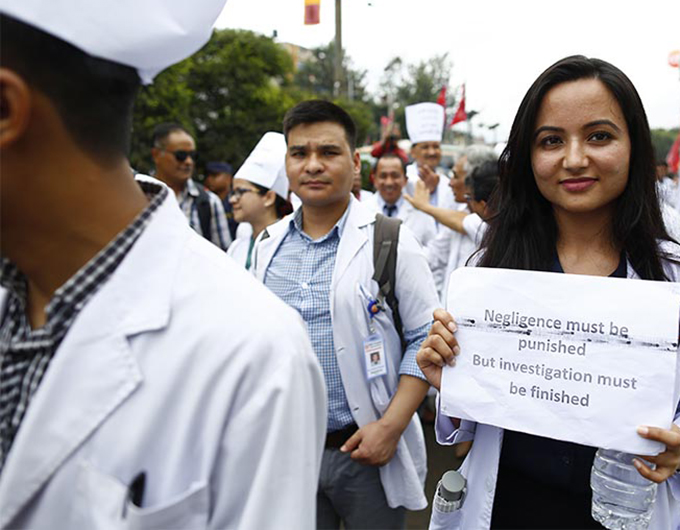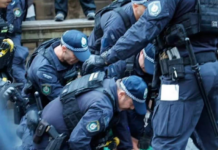
Nepal has recently updated its legal system with new civil and criminal codes. However, writes Rahul Bhattarai of Asia Pacific Report, failure to consult properly with stakeholders has led to protests and a strike by doctors.
Two new legal codes – civil and criminal – have been introduced in Nepal, threatening the medical profession and media industry, and dividing the country over the consequences.
Global and local media freedom groups have condemned the penal code because of limitations imposed on the freedom to provide news and information in the public interest.
Doctors went on strike over the new penal code earlier this month in protest against the criminalising of medical negligence and lodged a petition with more than 6000 signatures to the Nepal Medical Council.
READ MORE: Free press on edge as Nepal’s new laws take effect
The government has agreed to address the issue and opened negotiations with the Nepal Medical Association.
The Paris-based media watchdog Reporters Without Borders (RSF) has protested to the Nepalese authorities about the implications for news organisations, saying the new law constitutes an “unacceptable censorship tool”.
Journalists in Nepal could face up to three years in prison if they publish information deemed to be “confidential” under the new criminal code, says RSF.
Protection of privacy provisions also pose a “serious threat” to journalism.
Showing ‘disrespect’
“Sections 293, 294 and 295 criminalise publishing private information, recording conversations or taking pictures without permission,” says RSF in its review of the law.
“Under article 306.2, showing ‘disrespect’ towards someone either directly or through satire is also punishable by up to three years in prison.”
Critics of the new laws – replacing the general code, nationally known as Muluki Ain – say there was no consultation on the draft provisions before they were enacted.
Two people given the responsibility to draft the two laws were Khil Raj Regmi, a former de facto Prime Minister of Nepal and former Chief Justice Khel Kalyan Shrestha. Neither of them had discussed the the laws with relevant stakeholders before adopting them.
The two codes were implemented on August 17, replacing a 55-year-old law, which was created during the previous Panchyaat Kall self-government political system in the early 1960s.
The two new codes were passed without any formal discussion with stakeholders – journalists, lawyers and medical doctors, this has led to protests from doctors and journalists.
Doctors protest
“Halting medical services, hundreds of doctors — both government and private — participated in a protest march … The protesting doctors, who were joined by retired doctors as well, wore aprons and stethoscopes,” reports The Himalayan Times.
Reporting on the September 2 rally, The Times quoted senior orthopaedic surgeon Dr Govinda KC as saying the new law would directly affect patients rather than doctors.
“Instead of proposing tougher penalties, it will be more prudent to thoroughly investigate negligence on the part of doctors during treatment,” he was quoted as saying.
After the strike, the government agreed to start talks with the Nepal Medical Association.
But there has been some negative feedback from the public arguing that the government should not have come under pressure to change the penal code as it was undermining government credibility.

The government has also taken steps to communicate with the Federation of Nepali Journalists (FNJ) and has decided to amend certain legal provisions in the laws to protect the freedom of speech and freedom of expression.
The government had failed to discuss the laws before passing them through Parliament, says Radheshyam Adhikari a Senior Advocate at the Supreme Court of Nepal.
Stakeholders unconvinced
Also, after passing the codes, the government had failed to convince stakeholders about the new laws.
“In reality [the] penal code has not affected the civil code, although – due to the current government misusing the law by suing people under cyber law – there has been widespread panic within Nepal’s doctor community and the FNJ as well,” says Adhikari.
“Furthermore, the law regarding the press is different and this is a civil law, if we were to choose between the press law and civil law, we will have to choose the press law.
“Press law is the same old law, which clearly states that the journalists shouldn’t be prosecuted for expressing their freedom of speech,” Adhikari says.
“In the press, there is a civil law, that law is not created to target the journalists. Rather, it’s a law to change the relationship among the civilians in order to protect the right to privacy.
However, now there is a new privacy law separate from civilian law.
Government has agreed to the demands of the press and implemented more liberal provisions under the privacy law too, which should “protect the press,” says Adhikari.
‘No need for panic’
“There is no need for much panic over these laws.”
But the major concern in regard for journalists is that when an article is “shared on social media by someone once it is in the public domain, the sharer will be jailed rather than the government questioning the publisher of the content,” says Adhikari
Raju Basnet, editor-in-chief of Khojtalas Weekly and Khojtalasa.com, was arrested on September 10 over alleged cybercrime because of a report exposing an attempt to transfer the ownership of land by Harisiddhi Brick Industries in Lalitpur to a few private individuals.
It was alleged that the transaction of the land had the involvement of the Nepal Communist Party’s (NCP) lawmaker Pampha Bhusal and other leaders in the party, reports Myrepublic.
“I have spoken against this bill in the Parliament, and now the government has taken a high road and the journalist Raju Basnet has been released,” says Adhikari.
“A different person has been jailed for sharing information on social media,” he adds.
The government has taken matters into their own hands and have started prosecuting people.
Misuse of the law
“It is not right for the state to prosecute the individual by using the police force,” he says.
“Should there be an issue of defamation, we can always work under the defamation law. But without evoking the defamation law, going against the constitution is not a right thing,” says Adhikari.
“If there is an issue of defamation and if the subject doesn’t want to take a legal process, there is always an option to express your grievance to the Press Council”, says Adhikari.
“People are not being prosecuted due to the law, however, it is due to the misuse of the law, that has created panic in the country”, says Adhikari.
But Gopal Basnyat, news editor at Radio Nepal, says the new law makes a journalist “reveal their sources,” which is not only a threat to the press but also a threat to whistleblowers.
“We cannot reveal the sources as a journalist, it is our duty to protect them, it is against our press code of conduct,” says Basnyat.
Risk of prosecution
Under the new law, “if we don’t reveal the source, we risk being prosecuted.”
“It does affect free speech. The FNJ has been protesting against this law,” says Basnyat.
Many other journalists who have been protesting against this law, which some describe as more draconian than the Nepali law during the Panchyaat Kall era.
A Practising Advocate at the Supreme Court, Ashish Adhikari, says that the “Act in itself is good but the implication of the Act [by the government] part is questionable”.
He adds: “The first publisher isn’t being convicted but, the person who shares information that is already in the public domain is being charged and prosecuted.”
Rahul Bhattarai is a student journalist on the Postgraduate Diploma in Communication Studies (Journalism) reporting on the Asia-Pacific Journalism course at AUT University.











































